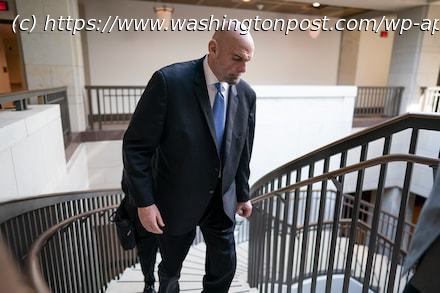Experts say his chances for a full recovery are very good, especially since he sought out help.
Sen. John Fetterman’s hospitalization for depression is most likely to be short and successful, more a reset during a difficult period than a life-altering, career-threatening event, according to mental health authorities, other stroke survivors, academic research and people on Capitol Hill.
Despite lingering misconceptions about the gravity of hospitalization for acute depression, it is mainly a safe, speedy way to address a crisis. The vast majority of people resume the lives they led previously, though they may need ongoing outpatient care.
“The hospitalization doesn’t necessarily say anything about his future status,” said Will Cronenwett, chief of general psychiatry at Northwestern University’s Feinberg School of Medicine. “Hospitalization is often the thing to do to recover quickly. A hospitalization, rather than ending anyone’s career, enables them to regain lost function.”
Data show Fetterman’s chances of full recovery at 70 to 90 percent, said Joshua Gordon, director of the National Institute of Mental Health. That doesn’t mean he won’t need to stay on medication or continue therapy afterward, but in all likelihood, he will find relief from his symptoms of depression and return to normal functioning.
“Many people are able to stop medications and maintain wellness,” he said.
Fetterman (D-Pa.), 53, flipped a Republican Senate seat in November despite suffering a near-fatal stroke in May. On Thursday, he checked himself into Walter Reed National Military Medical Center for treatment of clinical depression. He had just returned to Congress on Monday, after being hospitalized last week for complaints of lightheadedness. Doctors ruled out a second stroke.
Fetterman still suffers from an auditory processing problem that makes it difficult for him to hear and pick up words, especially against background noise.
A senior Fetterman aide, who spoke on the condition of anonymity to discuss private details of the senator’s circumstances, said Fetterman could be hospitalized for several weeks although there is no clear timeline.
The aide said Fetterman’s lightheaded spell last week was likely caused by malnourishment and dehydration. Only in retrospect did aides come to understand that not eating or drinking is a common side-effect of depression.
The aide said Fetterman was “deeply not himself” in the days that followed and after consultation with the attending physician of Congress, Brian P.
Home
United States
USA — Financial Depression risk rises after a stroke. What that means for John Fetterman.






